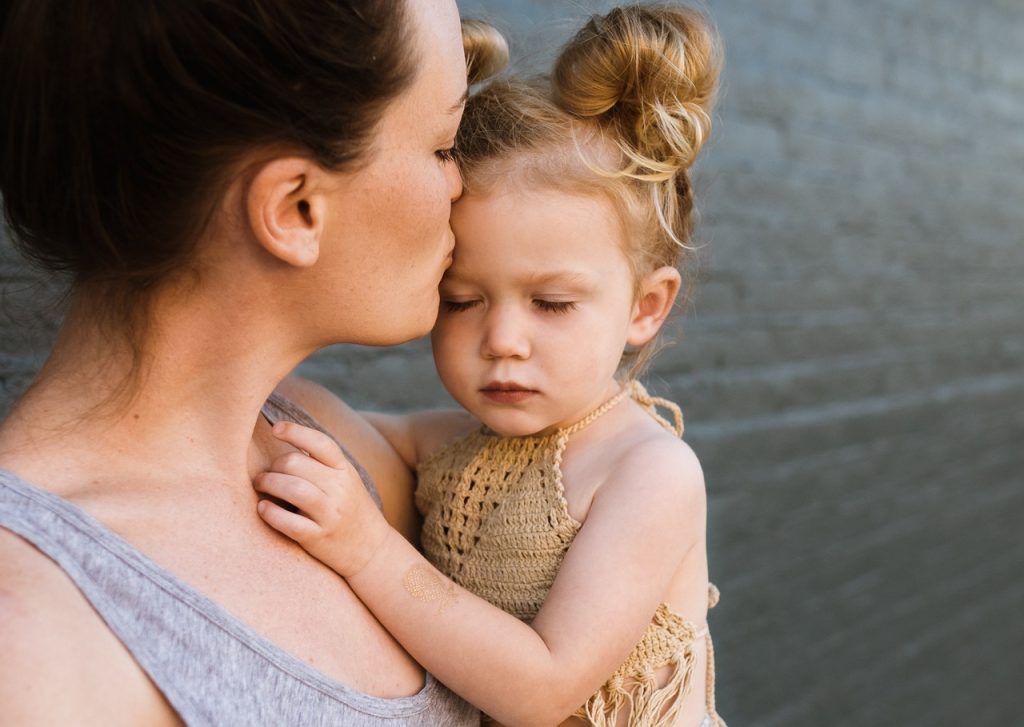
Last year, my 8 year old daughter suffered from intractable stomach aches. My husband and I employed every conscious parenting tool we had cultivated over the past 16 years of raising kids. We looked for root causes for her idiopathic pain, explored practical solutions, and above all else made sure she knew we were right there with her. We didn’t have all the answers, but we had a lot of empathy to give!
Meanwhile, we also worried about her strange condition, wondered if the impetus was psychological or physiological, and hated feeling powerless in figuring it out. Eventually, a specialist diagnosed her with “functional abdominal pain” and suggested that our approach might be an important part of what is keeping her stuck in this pain pattern. Imagine our shock when we heard that our perceived greatest asset as parents – our compassion – might be keeping her locked in her pain.
Skeptical, we tried new strategies at home: don’t ask too many questions about her stomach, empower her to take action to relieve discomfort herself, respond with a loving but unworried affect, acknowledge the pain briefly and move on. It went against the very fiber of my gentle parenting being to hold back my empathy, but it worked. She started to heal. It turned out that our fixation on her pain was keeping her locked into it.
There’s always a shadow side to any approach. And since most parents were raised themselves with parents who were too negligent or too authoritarian, erring on the side of more empathy ourselves is largely a great step in the right direction. At the same time, for those of us steeped in the world of peaceful parenting, we are wise to learn the nuance in this powerful approach.
A popular parenting book, Bad Therapy by Abigail Shrier attempts to right this swing by harshly criticizing what the author characterizes as over-indulgence of our kids along with a deep fear of their emotional struggles. There are kernels of truth buried within Shrier’s polarizing, hyperbolic assessment (as there often is in self-help books), yet she does the industry a grave disservice by metaphorically throwing the baby out with the bathwater. Rather than suggesting a few key, nuanced corrections to a blanket empathy-based approach, she suggests returning to a more stoic methodology, witholding our care and concern. This too, as we well know, has its own damaging impact when taken too far.
Somehow, we need to find the messy, magical “middle”.
How can you tell if you are overdoing the gentle/connection/empathic parenting approach? Here are a couple indicators (but by no means the only ones):
-
- How do you feel when your kids are in pain – especially emotional? Do you feel your heart soften and a desire to lean in? Or do you feel a panic, an absolute need to fix it, or a strong aversion to even the idea?
-
- How much do you worry about their future? Do you consider and wonder about it from time to time? Or do you picture a worst-case scenario often and actively parent in an attempt to avoid it?
Do you see the underyling theme here? Basically, if you are overly worried about your kids, they will be overly worried about themselves. They need our empathy, but not our worry. It takes experience, bravery, humility, and curiosity to dive into our own conditioned beliefs that drive worry without our conscious control, and it takes practice to learn a new, trust-based way to deliver your love and empathy to your kid.
My partner and I were thankfully able to turn our worry (disguised as empathy) dial down a notch. It wasn’t easy (and honestly, I had to hand the job over to him for awhile because I just couldn’t do it as well!) but in doing so, we found that we supported her own resilience, strength, and self-regulation.
And after we let the pendulum swing more toward handing her responsibility for managing her discomfort, we slowly added larger doses of empathy and support. If she’s in pain, I can go make her a hot water bottle without a lot of fuss and put my arm around her. She and I both have a compassionate and matter-of-fact way of managing her pain without feeding anxiety around it. We try to talk about it when emotions are calm and focus on when a conversation is looping her into a worry-vortex or just helping her process the challenge of managing chronic pain. Our more nuanced approach results directly from my reduction in anxiety for her along with our own experimentation and practice with new techniques.
Like so many things in evolved parenting, the work starts within ourselves. If you want to be a highly skilled gentle parent – one who embodies leadership along with gentleness, sturdiness with empathy, trust with compassion, investigate the unconscious beliefs, drives, and fears within you which polarize your approach, pulling it out of balance to respond to a need not present in the actual situation.
Interestingly, the book, Bad Therapy blames the experts for our ‘bad parenting’ and our children’s mental health woes, but does not at all point to the unconscious and sometimes generational relational patterns that can twist our parenting, sometimes gravely impacting our children. Contrary to Shrier’s central thesis, sometimes therapy is just what’s needed (for the parent, that is). If you’re struggling to do this profound work of becoming the skillful, nuanced parent you are meant to be, know that we are not meant to do it alone! Seek the support of an experienced coach or therapist who can hold and guide you through the tricky terrain of unwinding and becoming the parent you long to be.